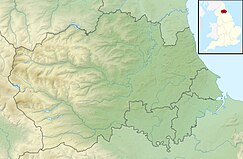| Middridge Quarry | |
|---|---|
| Location | MAGiC MaP |
| Nearest town | Newton Aycliffe |
| Coordinates | 54°37′18″N 1°37′0″W / 54.62167°N 1.61667°W |
| Area | 1.9 ha (4.7 acres) |
| Established | 1979 |
| Governing body | Natural England |
| Website | Middridge Quarry SSSI |
Middridge Quarry is a Site of Special Scientific Interest in the Sedgefield district of County Durham, England. It is a disused quarry, situated alongside the railway line between Newton Aycliffe and Shildon, 1 km south of the village of Middridge.
The quarry was excavated in Magnesian Limestone, the lowest level of which is an exceptionally fossiliferous marl slate which has yielded the richest and most varied Permian flora in the Britain and is the type locality for the pteridosperm Pseudoctensis middridgensis. [1] Fossils obtained from the quarry have included several species of fish and reptiles, [2] [3] [4] [5] numerous invertebrates and plants, and the site is considered to be of international palaeontological importance. [6]
- ^ Bell, J; J Holden; T H Pettigrew; K W Sedman (March 1979). "The Marl Slate and Basal Permian Breccia at Middridge, Co. Durham". Proceedings of the Yorkshire Geological Society. 42 (3): 439–60. Bibcode: 1979PYGS...42..439B. doi: 10.1144/pygs.42.3.439.
- ^ Sedgwick, A (1829). "On the geological relations and internal structure of the Magnesian Limestone". Transactions of the Geological Society of London. Series 2. 3: 37–124. doi: 10.1144/transgslb.3.1.37. S2CID 131431256.
- ^ Hancock, Albany; Richard Howse (1870). "On a new Labyrinthodont Amphibian from the Magnesian Limestone of Midderidge, Durham". Quarterly Journal of the Geological Society of London. 26 (1–2): 556–564. doi: 10.1144/GSL.JGS.1870.026.01-02.52. S2CID 128755826.
- ^ Hancock, Albany; Richard Howse (1870). "On Proterosaurus Speneri, von Meyer, and a new species, Proterosaurus Huxleyi, from the Marl-slate of Midderidge, Durham". Quarterly Journal of the Geological Society of London. 26 (1–2): 565–572. doi: 10.1144/GSL.JGS.1870.026.01-02.53. S2CID 129676053.
- ^ Evans, S E; M S King (May 1993). "A new specimen of Protorosaurus (Reptilia: Diapsida) from the Marl Slate (late Permian) of Britain". Proceedings of the Yorkshire Geological Society. 49 (3): 229–234. Bibcode: 1993PYGS...49..229E. doi: 10.1144/pygs.49.3.229.
- ^ "Middridge Quarry : Reasons for SSSI status" (PDF). Natural England. Retrieved 1 April 2022.
| Middridge Quarry | |
|---|---|
| Location | MAGiC MaP |
| Nearest town | Newton Aycliffe |
| Coordinates | 54°37′18″N 1°37′0″W / 54.62167°N 1.61667°W |
| Area | 1.9 ha (4.7 acres) |
| Established | 1979 |
| Governing body | Natural England |
| Website | Middridge Quarry SSSI |
Middridge Quarry is a Site of Special Scientific Interest in the Sedgefield district of County Durham, England. It is a disused quarry, situated alongside the railway line between Newton Aycliffe and Shildon, 1 km south of the village of Middridge.
The quarry was excavated in Magnesian Limestone, the lowest level of which is an exceptionally fossiliferous marl slate which has yielded the richest and most varied Permian flora in the Britain and is the type locality for the pteridosperm Pseudoctensis middridgensis. [1] Fossils obtained from the quarry have included several species of fish and reptiles, [2] [3] [4] [5] numerous invertebrates and plants, and the site is considered to be of international palaeontological importance. [6]
- ^ Bell, J; J Holden; T H Pettigrew; K W Sedman (March 1979). "The Marl Slate and Basal Permian Breccia at Middridge, Co. Durham". Proceedings of the Yorkshire Geological Society. 42 (3): 439–60. Bibcode: 1979PYGS...42..439B. doi: 10.1144/pygs.42.3.439.
- ^ Sedgwick, A (1829). "On the geological relations and internal structure of the Magnesian Limestone". Transactions of the Geological Society of London. Series 2. 3: 37–124. doi: 10.1144/transgslb.3.1.37. S2CID 131431256.
- ^ Hancock, Albany; Richard Howse (1870). "On a new Labyrinthodont Amphibian from the Magnesian Limestone of Midderidge, Durham". Quarterly Journal of the Geological Society of London. 26 (1–2): 556–564. doi: 10.1144/GSL.JGS.1870.026.01-02.52. S2CID 128755826.
- ^ Hancock, Albany; Richard Howse (1870). "On Proterosaurus Speneri, von Meyer, and a new species, Proterosaurus Huxleyi, from the Marl-slate of Midderidge, Durham". Quarterly Journal of the Geological Society of London. 26 (1–2): 565–572. doi: 10.1144/GSL.JGS.1870.026.01-02.53. S2CID 129676053.
- ^ Evans, S E; M S King (May 1993). "A new specimen of Protorosaurus (Reptilia: Diapsida) from the Marl Slate (late Permian) of Britain". Proceedings of the Yorkshire Geological Society. 49 (3): 229–234. Bibcode: 1993PYGS...49..229E. doi: 10.1144/pygs.49.3.229.
- ^ "Middridge Quarry : Reasons for SSSI status" (PDF). Natural England. Retrieved 1 April 2022.
